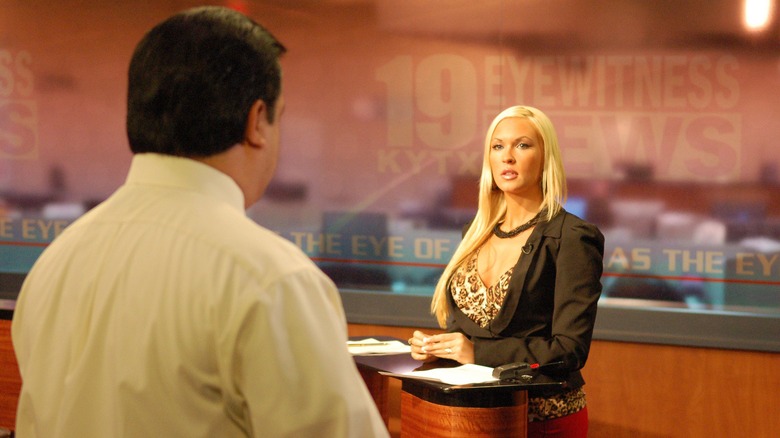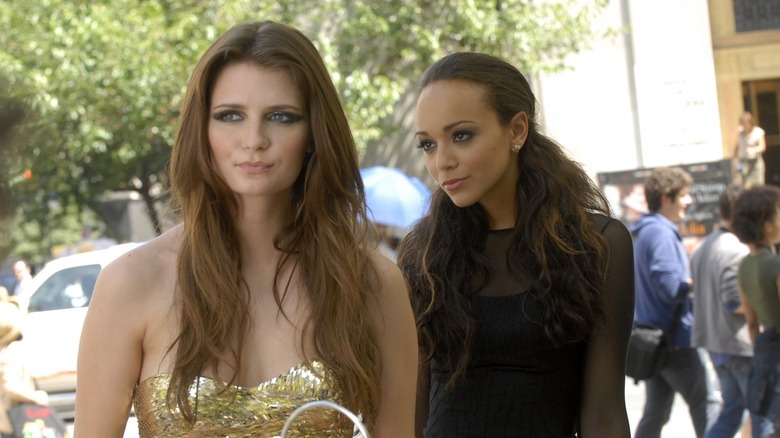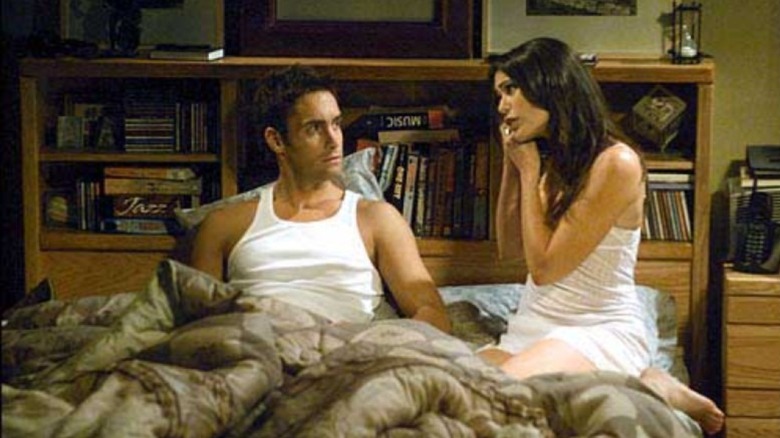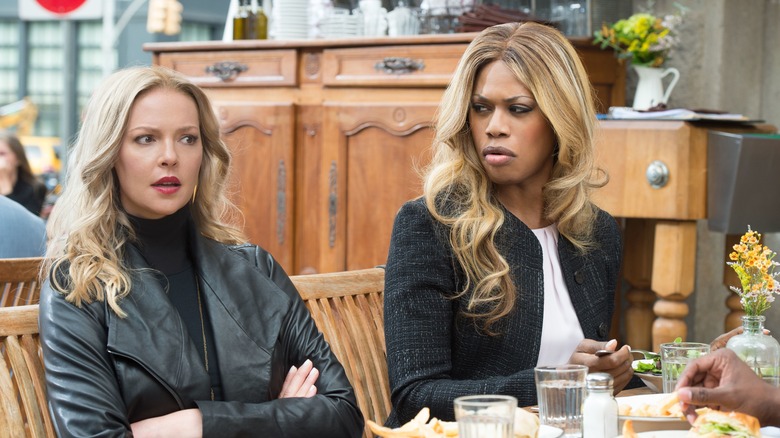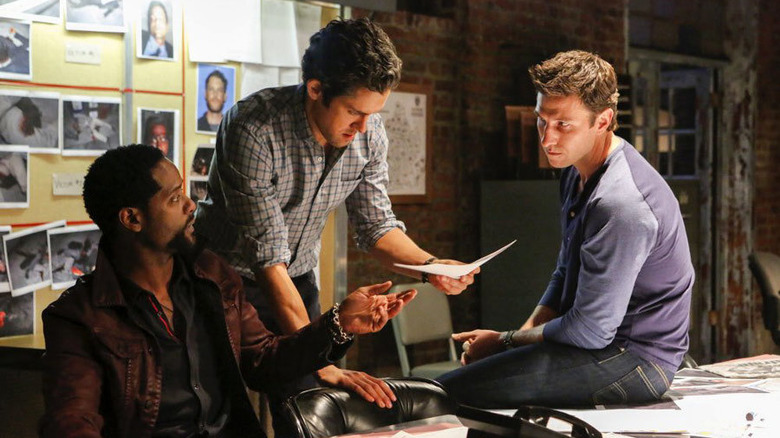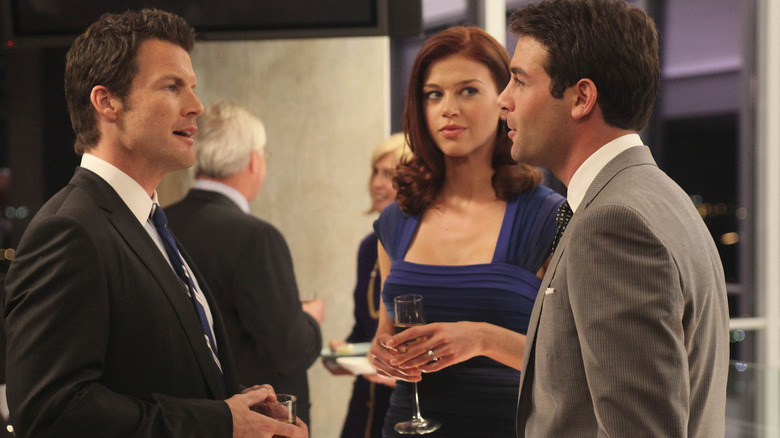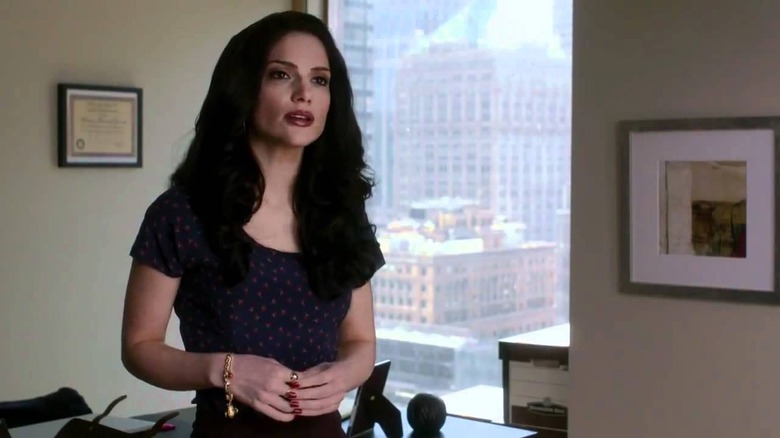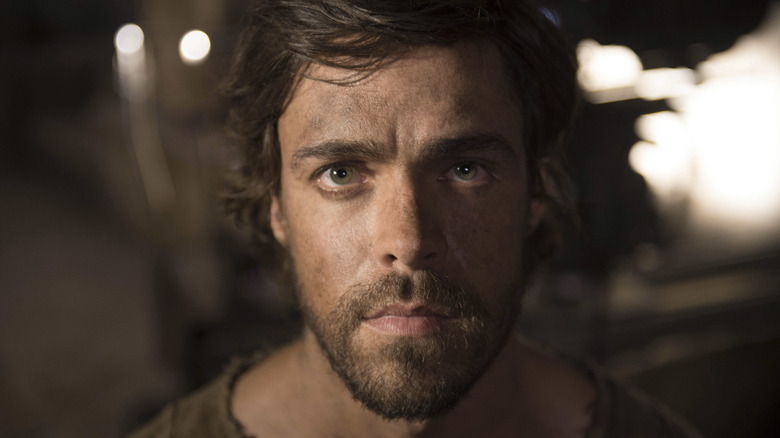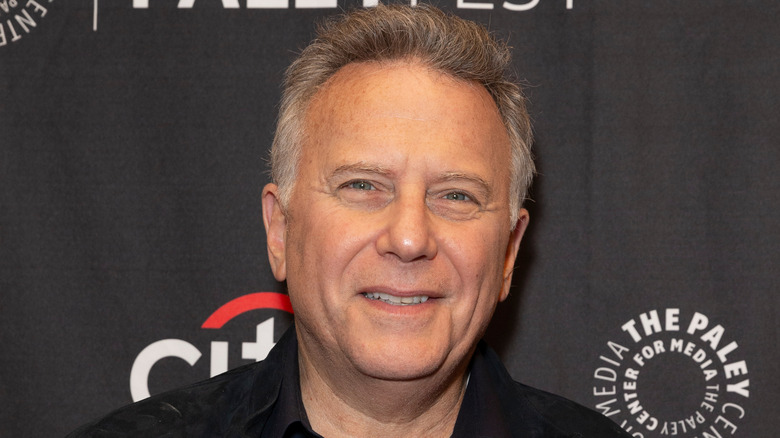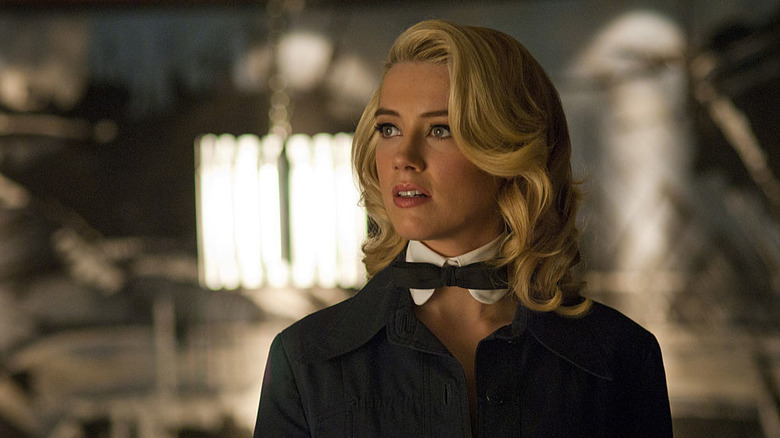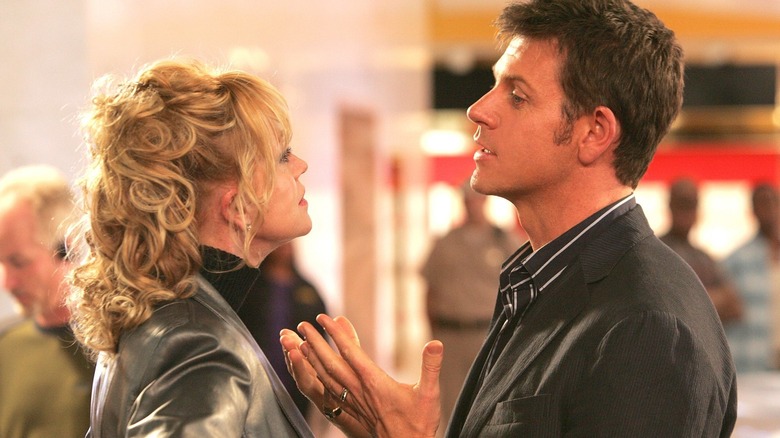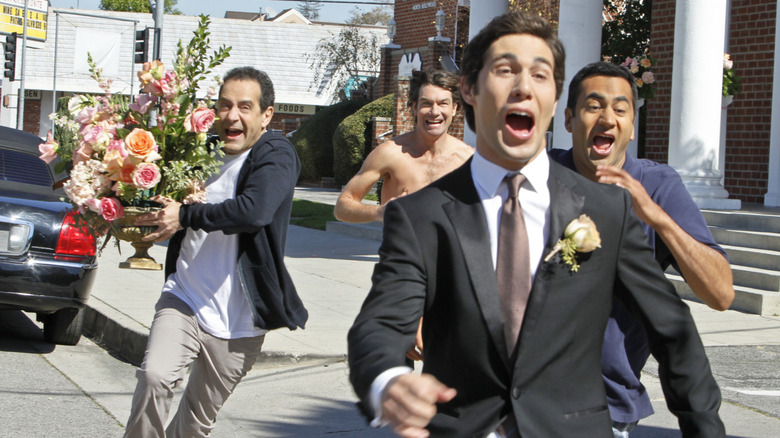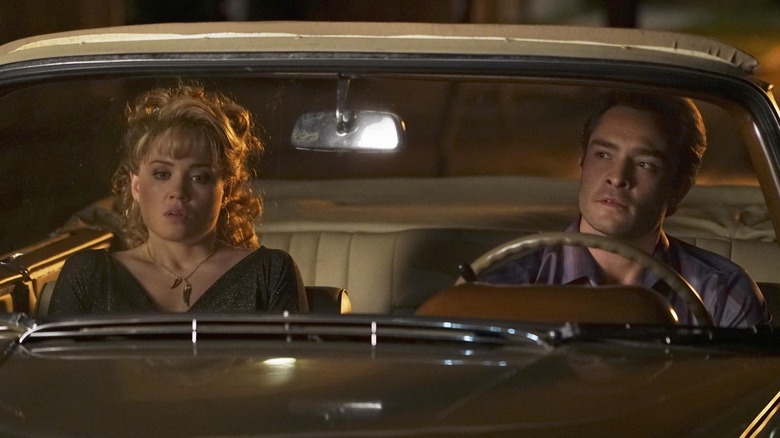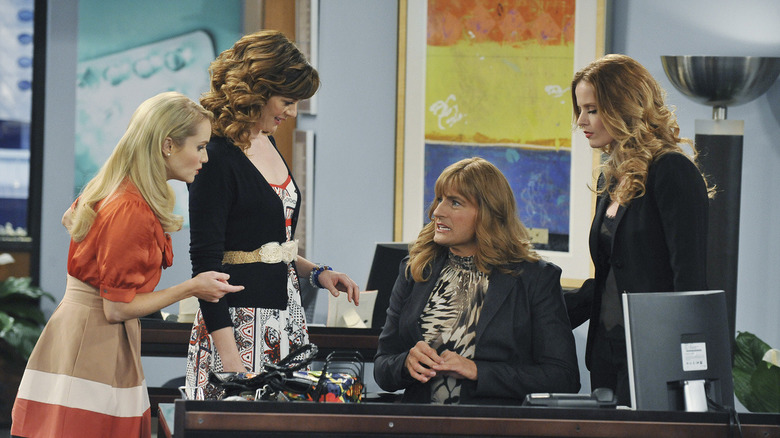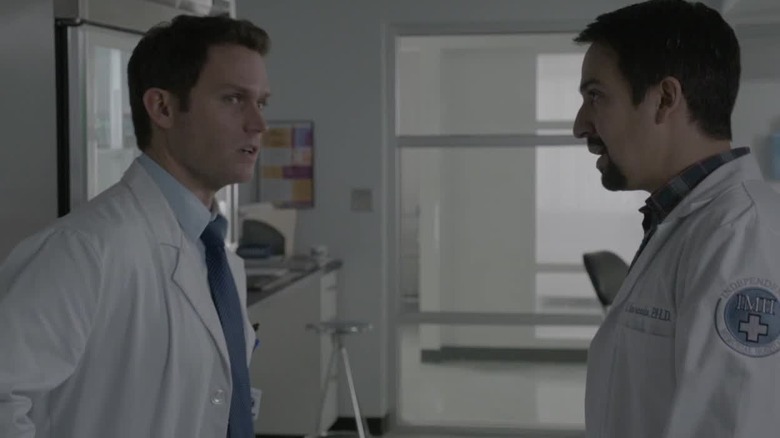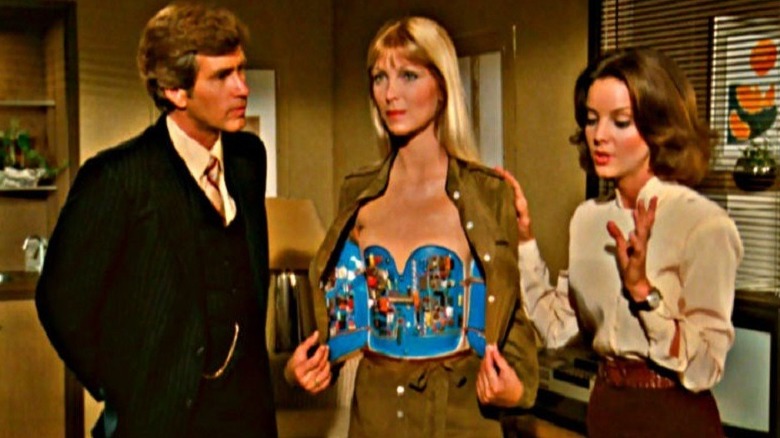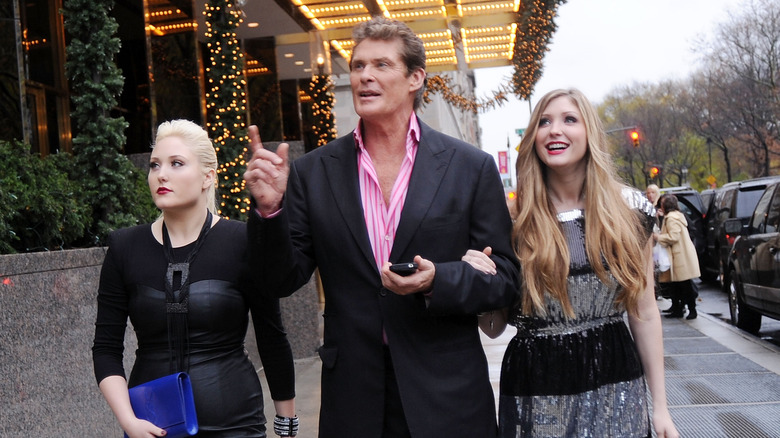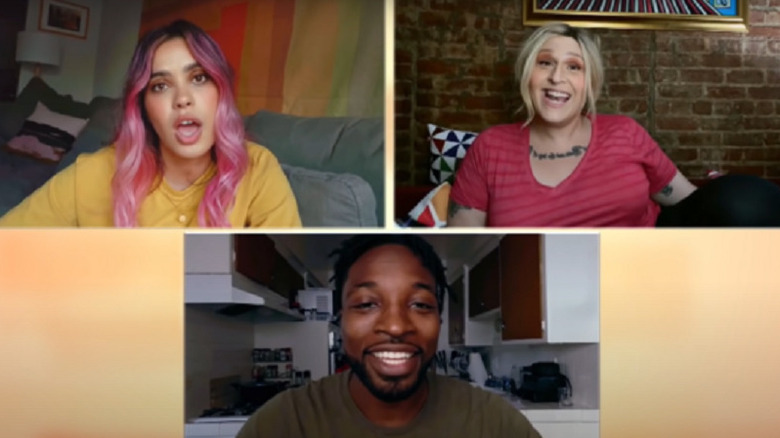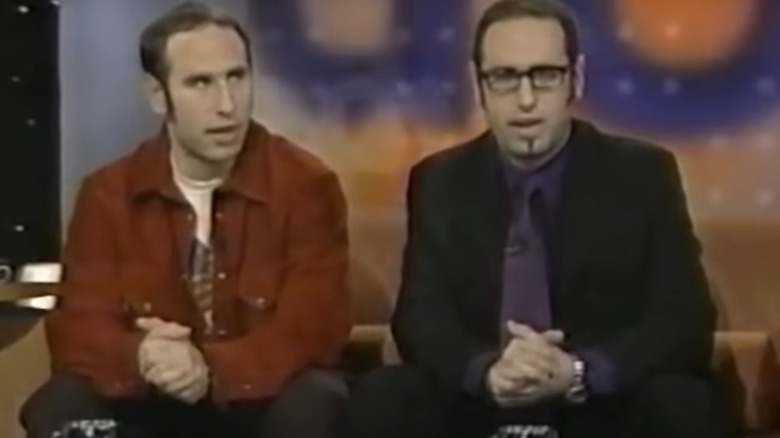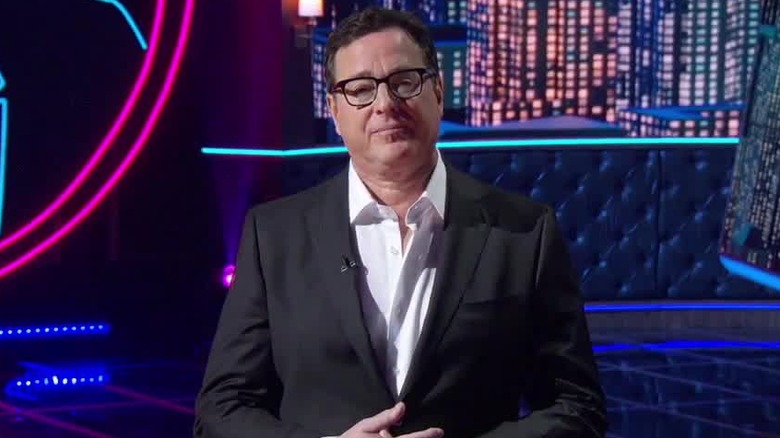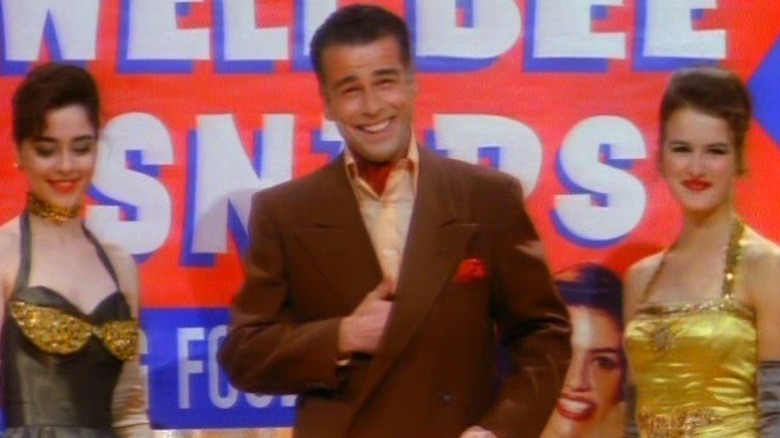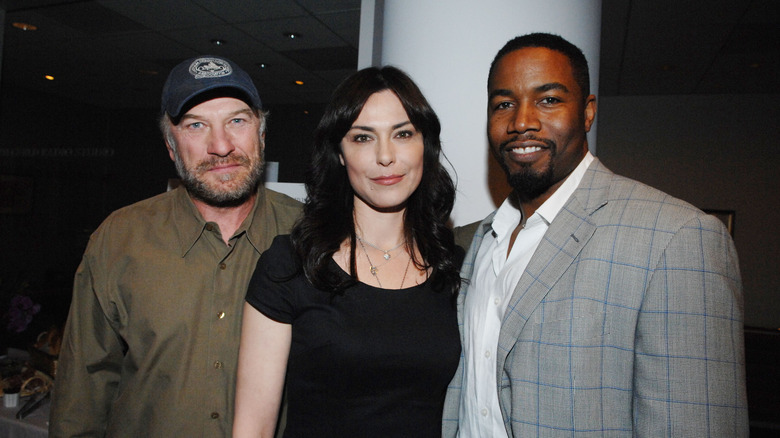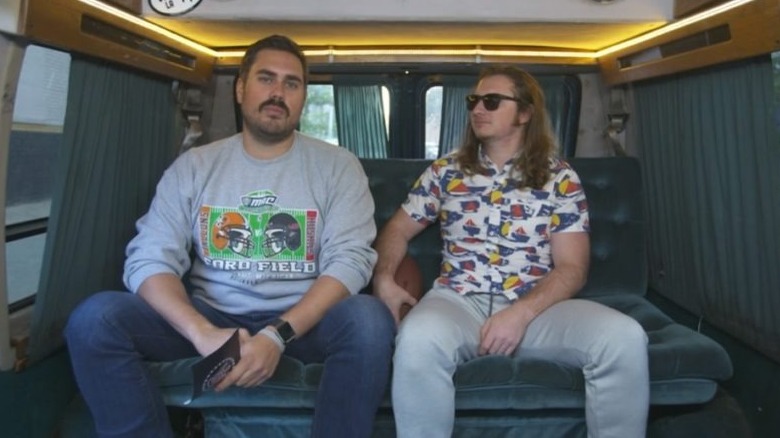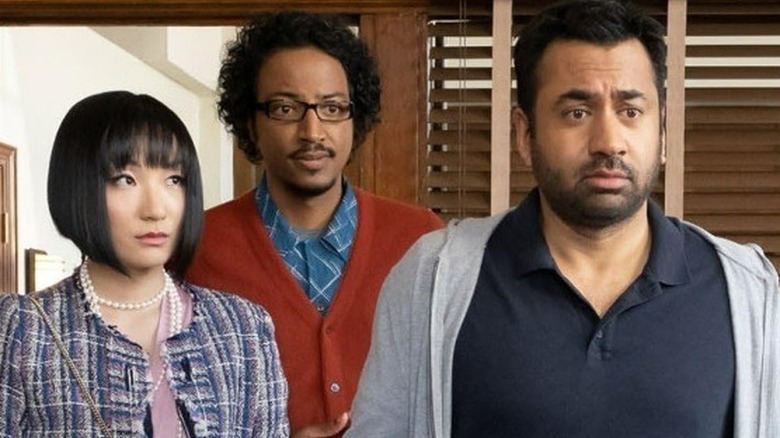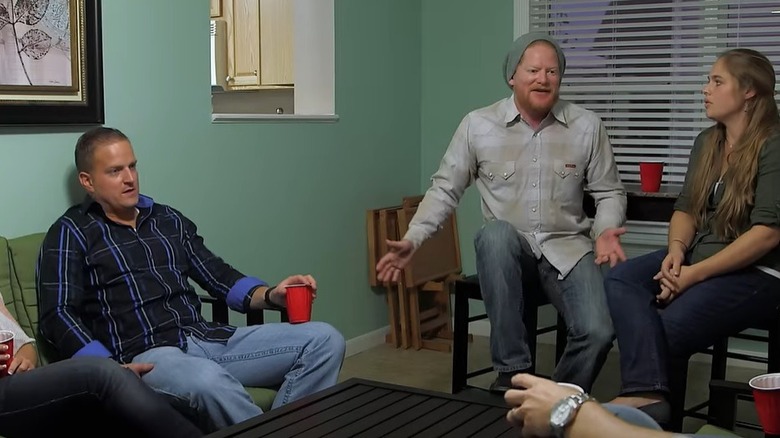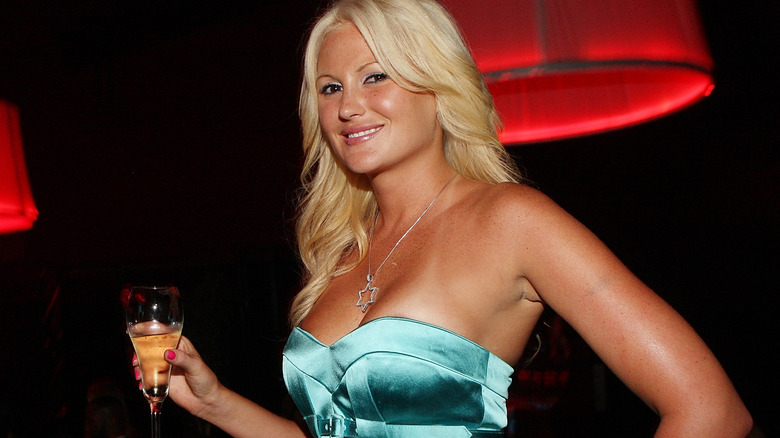TV Shows That Didn't Make It To Five Episodes
Dozens and dozens of potential TV show creators head to the big networks every year looking to get their show on the air. Very few make it to the pilot stage and even fewer actually make it to series. However, even with such a long and competitive process, not all of the shows that get on the air are instant hits. Some, in fact, are so badly received by audiences that they're canceled before they even get off the ground. Here are some TV shows that were canceled before they hit the five-episode mark.
Anchorwoman
It only took one night for Fox to decide it didn't want to see any more of the reality show "Anchorwoman." The show, which the network aired in August of 2007, was canceled after airing two back-to-back episodes, reaching only 2.7 million viewers throughout the night.
The show followed former "The Price Is Right" model Lauren Jones as she tried to make herself into a news anchor at a Texas TV news station. The series pitted Jones against the network's 5 p.m. anchor Annalisa Petralia, and Fox even promoted their rivalry on its website with an "Are you Lauren or Annalisa" quiz that asked questions about what you would wear to work and whether a female anchor's duty is to "bring sexy to the news" or, you know, do actual reporting.
Needless to say, the show was controversial from the get-go, and it was trashed by critics once it premiered. "If you hate women, men, Texas, Los Angeles, television news and any of the social progress made by Americans in the 20th century, then Anchorwoman is the show for you," wrote one reviewer. Ouch.
The Beautiful Life: TBL
Mischa Barton's dramatic exit from "The O.C." may have left many fans reeling, but they still weren't ready to follow Marissa Cooper to her next project. Barton's next big TV role, starring in the CW show "The Beautiful Life: TBL," only lasted for two episodes before the show was canceled due to low ratings.
"The Beautiful Life," as its name would suggest, follows a group of very beautiful people, led by Barton's Sonja Stone — a supermodel returning to the scene after dropping off the map. Sara Paxton, Ben Hollingsworth, Corbin Bleu, Elle Macpherson, and Ashley Madekwe also starred in the series, which can probably best be remembered for featuring an early appearance from future "Wonder Woman" star Gal Gadot.
Aside from its well-known stars, "The Beautiful Life" also had some impressive talent behind the camera. It was executive produced by Ashton Kutcher and based in part on his days as a young model. However, even with the CW-ready premise and Kutcher's name attached, it still only brought in 1.1 million viewers for its second episode.
Fans (and there were a couple of them) were upset to see the show canceled, and more than 8,000 people signed a petition to bring it back to no avail. Kutcher was adamant about still getting the produced episodes of the show out to the public when it went off the air, and he was able to land a deal with Hewlett-Packard to have them all uploaded to YouTube for fans to watch ad-free.
Coupling
"The Office" may be the model example for a British TV series turning into a successful American sitcom, but most attempts to take comedies stateside have failed. One such experiment was "Coupling," NBC's attempt at adapting the BBC Two romantic comedy series from "Doctor Who" writer Steven Moffat. The show is based on his relationship with producer Sue Vertue.
NBC started looking into the show when "Friends" was nearing the end of its run. However, the attempts to bring "Coupling" to the States were troubled from the start, with the network shooting and then scrapping a pilot because they felt Moffat's script was too confusing. Three of the six lead roles were recast when the pilot was re-shot.
To help keep advertisers happy, the show wound up deleting some of the bawdier jokes from the initial script while still trying to push the boundaries of broadcast TV. The final version of "Coupling" ended up being a weird hybrid — a bit too much like the British version to set itself apart but also different enough to completely throw off fans of the original show. The series was criticized by some for being watered down.
"Coupling" ended up getting the axe after only four low-rated episodes on NBC, although Moffat had much more success with the British version, which ran for four series. Moffat blamed NBC for the show's cancellation and later said it taught him "not to work in America" anymore. "I say that slightly facetiously, but truthfully, I'm British, what is the point of me going to try to make it somewhere else?" he told The New York Times in 2014.
Doubt
Katherine Heigl's return to TV after "Grey's Anatomy" didn't exactly go as planned. The actress signed on to lead the spy drama "State of Affairs" in 2014, but that was canceled after just one season. Her next series, the CBS legal drama "Doubt," fared even worse, lasting just two episodes before getting the axe.
"Doubt" had troubles from the start. The show was initially set up with KaDee Strickland and Teddy Sears in the lead roles before being recast. However, it did land an impressive group of new stars for its second attempt at making it to air, including "Psych" and "The West Wing" actor Dulé Hill, "The Good Wife" alum Dreama Walker, and "Orange is the New Black" star Laverne Cox — the latter becoming the first transgender series regular on a broadcast show.
Despite the impressive cast, the show received mixed reviews from critics, most of whom said that the talented leads were wasted in the rote storyline. The series was ultimately pulled from the CBS schedule after two episodes, with the show opening to just a 0.8 in the key 18-49 age demographic and falling to a dismal 0.6 for its second episode (meaning almost nobody watched). The official cancellation came down shortly before the network's upfront presentations; they wound up burning off the remaining episodes of the show on Saturday nights over the summer.
Ironside
Remakes may be all the rage nowadays, but not every one is successful. Such was the case for NBC's attempt at remaking the popular '60s and '70s cop procedural "Ironside," this time with Blair Underwood starring as the title character — a police officer who uses a wheelchair and has a talent for solving the city's most difficult cases.
Underwood's take on the show was imagined as grittier and darker than the original, which didn't sit well with many viewers. The show was also hit with controversy from disability rights advocates, with some groups calling out NBC for casting a non-disabled actor in the role of a disabled character. (The show's producers later defended the decision, saying they needed an able-bodied actor so they could include flashbacks set before the character's injury.)
The show wound up getting trashed by critics and only aired three episodes before it was pulled from the schedule. Although it received solid ratings for its pilot, mostly thanks to a lead-in from "Law and Order: SVU," it wound up tanking in later weeks, drawing just a 1.0 rating in the key 18-49 demo for its third episode.
Lone Star
Fox's drama "Lone Star," which featured veteran actor Jon Voight and then-up-and-comer Adrianne Palicki, was canceled after just two episodes.
Unlike many of the series on this list, "Lone Star" is not actually considered a bad show. In fact, The A.V. Club's Emily St. James even declared the series — which starred James Wolk as a conman living a double life — "the best network pilot of the year." However, good reviews weren't enough to bring in the viewers, with the show boasting just 4.1 million viewers (a number that's respectable in cable but not so much on network TV) and losing 68% of the audience from its lead-in, "House."
Show creator Kyle Killen ended up writing an open letter begging viewers to tune in to the second episode, but it wasn't enough. The show fell to just 3.2 million viewers by then, and it was canceled shortly after. Production on five episodes had been completed, but they were never aired.
The show's high quality might actually have been partially to blame for its cancellation. Killen told Esquire that the network was so enthusiastic about the show that it touted it heavily to advertisers, causing them to expect it to be "much larger than it was." However, the show's heavily serialized storyline didn't fit in with the typical dramas of the time, and it was tough to bring viewers on board. While it may have had a better chance of success in today's more experimental TV landscape, 2010 just wasn't ready for it.
Made in Jersey
Being shuffled to Friday nights is never a good sign, and the 2012 CBS procedural "Made in Jersey" was sentenced to the death slot before it even started. The legal drama starred Janet Montgomery as a New Jersey born and raised attorney who gets a job at a big New York City law firm.
The show received mixed reviews from critics, but it didn't fare well in the ratings. After premiering to 7.8 million viewers, its second episode dropped to 5.8 million and a 0.8 rating. This wasn't enough to keep it on the schedule, and CBS ended up pulling the show and replacing it with "Undercover Boss" after just two episodes.
Of Kings and Prophets
ABC's "Of Kings and Prophets" is a biblical series that tells the story of the King of Israel (Ray Winstone), a powerful prophet (Mohammad Bakri), and a young shepherd (Olly Rix) as their paths get closer and closer to intersecting.
"Of Kings and Prophets" was given a straight-to-series 15-episode order, with the show reportedly a favorite of ABC Entertainment Group president Paul Lee. However, its launch was plagued from the start, with the show going through a number of re-castings and reshoots and ultimately being pushed to mid-season.
The costly series was supposed to be ABC's answer to "Game of Thrones" in 2016, but it came nowhere close to the quality of the HBO drama, earning a 25% aggregate score from critics on Rotten Tomatoes. The show was rewarded with some pretty dismal ratings, premiering to 3.3 million viewers. It didn't help that it was sentenced to the Tuesday at 10 p.m. time slot, which had been a death knell for many past ABC shows.
"Of Kings and Prophets" was met with controversy in other areas as well. The series infused the Biblical story with a lot of sex and violence, leading to a condemnation from the Parents Television Council. The show's creators said they wanted to push the envelope of what's acceptable on broadcast, but it looks like they may have pushed a little too far.
The Paul Reiser Show
Launching a show with a big-name comedian has worked well in the past, but that wasn't the case for NBC's "The Paul Reiser Show" in 2011. The series featured the "Mad About You" actor as a former TV star who decides to find his next big project after taking a few years off to be with his family.
Although Reiser holds four Golden Globe nominations for his work on "Mad About You," critics were less kind when it came to his own sitcom, criticizing it in part for feeling like a less fun copy of Larry David's "Curb Your Enthusiasm." The show currently sits at a dismal 5% critical score on Rotten Tomatoes.
The reviews didn't help the series in the ratings, and it premiered to only 3.3 million viewers and a 1.1 in the key demo, marking NBC's lowest-ever comedy premiere. Its second episode fell even further, dropping to 2.5 million viewers and a 0.9, and NBC ended up pulling it and replacing it with reruns of "The Office."
Reiser was none too happy with the decision. In a prickly appearance on "The Tonight Show With Jay Leno" (via The Hollywood Reporter), he joked, "It turns out they said we enjoy missing you more than actually having you. But listen, I don't take it personally. Listen, when you're the last place network, you don't want to jeopardize that. You've found your niche. Stay there. So, I get it." Ouch.
The Playboy Club
The 1960s and Playboy Bunnies may seem like great ideas for a TV show, but NBC's "The Playboy Club" proved that was not the case in 2011. The historical drama featured Eddie Cibrian as Nick Dalton, an attorney with political aspirations who frequents the notorious Playboy Club. The club's "bunnies" included some future stars, including Amber Heard, Jenna Dewan Tatum, and Laura Benanti.
"The Playboy Club" got a lot of backlash, with the Parents Television Council calling the show "degrading and sexualizing" and asking audiences to boycott. Their request was backed up by activist Gloria Steinem, who told Reuters the show was "clearly" not going to be accurate and that it portrayed the "tackiest place on earth" as "glamorous." Multiple advertisers, including Lenovo, Kraft, and Sprint, pulled out of the show due to the controversy.
Although many blamed the behind-the-scenes drama for the show's bad buzz, some insiders offered other reasons for its failure to connect with audiences. "It was a fundamentally flawed concept," one source told TV Guide. "It's a soap, which inherently appeals to women. But it's a brand so tied to men. I just think it was doomed from the start."
Ultimately, the series ended up failing in the ratings and received bad reviews from critics. It brought in only five million viewers and a 1.6 rating in its premiere, falling to 3.8 million and 3.2 million viewers for its second and third (and final) episodes, respectively.
Viva Laughlin
Another attempt at bringing a British TV series to the states, "Viva Laughlin" only made it through two episodes before CBS pulled it off the air in 2007. The show, a U.S. remake of the BBC series "Viva Blackpool," featured a musical take on the mystery genre, following a businessman (Lloyd Owen) who dreams of running his own casino.
"Viva Laughlin" was roundly bashed by critics, with The New York Times' Alessandra Stanley calling it "the worst new show of the season" and in the running for "the worst show in the history of television," while The Los Angeles Times' Robert Lloyd questioned how the show could be "both stale and half-baked." Newsday included the series on its list of the worst shows of the 21st century.
"Viva Laughlin" debuted to 8.4 million viewers, which may sound like a big number, but it pales in comparison to its lead-in, "CSI," which pulled in 21.2 million viewers. The show dropped to 6.8 million viewers in its sophomore outing and was bumped in favor of new airings of "The Amazing Race."
"Viva Laughlin" did have one thing going for it, though: The series was executive produced by none other than Hugh Jackman, who also guest-starred as the rich casino owner Nicky Fontana. Jackman's wife Deborra-Lee Furness told press that the pair was "disappointed" that the show got canceled but that she was still happy they took a risk. "He did it for fun," she said of Jackman's turn.
We Are Men
The quick demise of the CBS sitcom "We Are Men" in 2013 proves that sometimes even big stars aren't enough to save a show. The comedy series brought together Tony Shalhoub, Kal Penn, and Jerry O'Connell, along with "How I Met Your Mother" Emmy nominee Rob Greenberg, but their collective star power couldn't prevent the show from getting the axe after two episodes. It didn't help, of course, that the series was trashed by critics, currently sitting at 4% on Rotten Tomatoes.
"We Are Men" premiered to 6.4 million viewers and a 2.0 rating in the key 18-49 demo, dropping to 5.4 million viewers for its second episode. The show failed to hold onto the audience of its lead-in, "HIMYM," and its performance made it a disappointing precursor to CBS' other big comedy "2 Broke Girls." The network ultimately determined that reruns of "The Big Bang Theory" (and, eventually, "Mike and Molly") would fare better in the slot.
Wicked City
Remember that ABC Tuesday at 10 p.m. time slot that led to the quick cancelation of "Of Kings and Prophets"? Well, that slot's previous occupant didn't fare so well either. That honor went to the Ed Westwick-starring drama "Wicked City," which lasted only three episodes before the network pulled the plug.
"Wicked City" takes place in 1982 Los Angeles and follows two police detectives (Jeremy Sisto and Gabriel Luna) on a mission to capture the notorious Hollywood Slayer (Westwick). The show did not fare well with audiences, kicking off with a depressing 0.9 rating in the key demo and falling to 0.7 for its second episode and 0.4 for its fourth. The 0.4 rating was the lowest number for an original telecast on any of the big four networks (ABC, CBS, FOX, and NBC) that fall.
"Wicked City" was canceled midway through production on its eighth episode, but the show's producers were allowed to finish it up so that it could become the show's de facto finale when the entirety of the series' run was put up on Hulu. Executive producer Laurie Zacks assured fans at the time that the final episode provided a "great ending" that made the series' story "complete" (via Variety).
Work It
Some shows seem like they're doomed right from the premise, and "Work It" is a prime example. The ill-advised 2012 ABC sitcom starred Ben Koldyke and Amaury Nolasco as two recently laid-off men who decide to remedy their situation by posing as women to get jobs at a pharmaceutical company.
The show was, predictably, met with controversy from many LGBTQ+ groups, including GLAAD, who said that the show was harmful to the transgender community. GLAAD's then-acting president Mike Thompson said that the show would contribute to transphobia and the idea that trans people are just "men pretending to be women" rather than people trying to live their lives authentically.
The show earned even more criticism when the pilot aired, with Puerto Rican activists taking objection to Nolasco's character saying in the pilot that, because he is Puerto Rican, he would be good at selling drugs. The protest spilled just beyond angry internet comments — 50 people gathered in freezing cold temperatures to protest outside of ABC's studios in Manhattan.
Controversy aside, "Work It" was also just not a good show. The series was absolutely trashed by critics, and that didn't reflect well in the ratings. The show opened to a 2.0 rating in the key demo and fell to just a 1.6 in week two.
Do No Harm
Networks are constantly chasing the next "ER" or "Grey's Anatomy" dragon, which is why there are roughly 300 different medical shows on the air at any given moment. Not unlike restaurants, the vast majority close up shop within the first year. "Do No Harm," which debuted on NBC in January 2013, would've been happy to get even that. Instead, NBC gave the show just two episodes to find an audience, and when it didn't immediately do so, the plug was pulled.
The road to getting "Do No Harm" on the air to begin with was a bumpy one, full of scheduling conflicts and a reduction in the original number of ordered episodes that all occurred before the show premiered in the first place. To its credit, "Do No Harm" at least attempted to stand out in a very crowded genre by having a Jekyll and Hyde conceit, as the main protagonist — Dr. Jason Cole (Steven Pasquale) — has a darker alternate personality named Ian Price. It also starred an up-and-coming actor named Lin-Manuel Miranda in a recurring role, the same year he was workshopping a little musical called "Hamilton."
But critics were not impressed, and audiences weren't convinced enough by the show's twist to give it a chance. Though the show was technically canceled after just two episodes, the remaining 11 that had already been produced were burned off during the subsequent summer — when hardly anyone is watching TV anyway.
Beyond Westworld
The title "Westworld" is now most prominently associated with the 2016-2022 HBO series of the same name, but most are aware that the franchise started with a 1973 movie written by Michael Crichton. What far fewer people know is that the "Westworld" franchise has more projects than just those two. For one thing, there was a sequel movie called "Futureworld" that was released in 1976. There's also what is perhaps the most obscure part of the franchise thus far — an extremely short-lived network television series that predates the HBO show by 36 years.
"Beyond Westworld" premiered on CBS in March 1980 and was something of an alternate timeline sequel to the original movie that pretends "Futureworld" didn't happen. The cast consists of entirely new characters, which probably didn't help sell it to fans of the film who would've been interested to see a more direct continuation. Sci-fi is always a tricky proposition for a network to take on, as production costs are typically on the higher side, and therefore, the show needs to have strong enough ratings to justify the cost and effort.
After airing only three episodes, CBS decided that "Beyond Westworld" was worth neither the cost nor the effort, not even seeing fit to air the two other episodes that had already been produced. Still, those three episodes impressed the Television Academy, which nominated "Beyond Westworld" for two Primetime Emmys. The full five-episode run eventually aired in Europe and was released on DVD.
The Hasselhoffs
They say nostalgia follows a 20-year rule, wherein what defines current retro trends is typically whatever was popular 20 years prior. It also seems to be that aging celebrities get offered a reality show once it's been about 20 years since they were last in the mainstream public consciousness. Sure enough, a little over 20 years after the debut of "Baywatch," David Hasselhoff got his own reality show in 2010 called "The Hasselhoffs."
Following the trend of reality shows like "The Osbournes," "Hogan Knows Best," and "Gene Simmons: Family Jewels," the show wasn't just about The Hoff himself, but also his family — in this case, his daughters Hayley and Taylor-Ann, who were 18 and 20 years old, respectively, at the time. It followed David trying to help his daughters launch their own showbiz careers while also trying to breathe new life into his own. The show debuted on A&E in December 2010 via back-to-back premiere episodes.
According to Neilson ratings, over 200,000 people clicked off after the first episode and didn't tune in for the second. Given that the first episode only had a little over 700,000 viewers to begin with, it didn't bode well for the show going forward. So A&E cut its losses and let the show forever remain a one-night-only event. Since then, Taylor-Ann has done a little acting, while Hayley has made a name for herself as a model.
Connecting...
A lot of people had very little in-person interaction for long stretches during the worst of the COVID-19 pandemic, with the bulk of it having to be done via video calls and the like. And there were a few movies and shows that addressed that directly, including the NBC sitcom "Connecting..." The entire show plays out over the various screens that the characters are talking to each other through, sometimes one-on-one and other times with much larger groups at once.
Reviews were generally positive, but audiences might not have wanted to be reminded of how hard it had been to stay in touch with their friends and family remotely, as ratings were poor from the start. By October 2020, when "Connecting..." debuted, parts of the world had begun opening back up again, and people were probably too busy rushing back out to their favorite stores and restaurants to watch a show that relived what it was like to be cooped up inside for months on end. Only four of the eight episodes ordered by NBC ended up airing on the network.
Fittingly enough, the remaining four episodes were subsequently made available on NBC.com and have since been added to various streaming services. Strangely, it is currently not available on Peacock, NBC's own streaming service and the first streamer it was added to.
Dot Comedy
As more people began to turn to the Internet as their primary source of entertainment, traditional television had no choice but to repurpose Internet content for itself. This is why "Tosh.0" ran for as long as it did, why "Talk Soup" eventually transitioned from strictly talk show clips to Internet clips, and why MTV largely consists of non-stop "Ridiculousness" marathons these days. TV shows that are built around people showing stuff from the Internet and making fun of it is a genre unto itself at this point.
Twin brother comedians Randy and Jason Sklar — often jointly credited as the Sklar Brothers — deserve a lot of credit for helping to pioneer this genre years before it became commonplace. In 2000, when the Sklar Brothers-hosted series "Dot Comedy" debuted, it wasn't yet a forgone conclusion that a sizable chunk of the television viewing audience even had Internet access at all. So a show that attempted to highlight funny Internet clips and creators was perhaps a little too ahead of its time for its own good.
This was, after all, a full five years before YouTube even launched, to say nothing of how many years it was before the average person was actually aware of and regularly visiting the video-sharing site. Nobody really knew what to make of "Dot Comedy," and so nobody really watched it. The ratings on the first episode were so poor that ABC didn't air the additional four that had already been made.
Videos After Dark
Tom Bergeron hosted "America's Funniest Videos" for almost twice as many seasons as Bob Saget, and current host Alphonso Ribeiro's own tenure has also already outlasted Saget's. But Saget will forever be the show's original host and the one older viewers will always most associate with the iconic series. This is a fact that wasn't lost on the show's creator, Vin Di Bona, which is why he enlisted Saget to host a spin-off called "Videos After Dark" in 2019.
While Saget was still most widely known as the squeaky-clean sitcom dad of "Full House" fame during his original "AFV" stint, people were far more aware of his raunchy standup comedy style by the 2010s. This made him the ideal host for "Videos After Dark," which was to feature more adult-oriented videos than the flagship series — though still within the guidelines of primetime network television, as the show aired on ABC. In addition to new submissions, the show was said to be pulling from the existing backlog of content that had been sent to and discovered by "AFV" over the years but had been too edgy for that series.
Of course, people already had the Internet for that, leaving "Videos After Dark" feeling superfluous. What was intended to be a one-night, two-episode test run for an eventual series retroactively became a one-off special. Nobody involved with the show has ever stated why it never came back as promised — it just never did.
On the Air
The fact that a show as bizarre as "Twin Peaks" made it onto network television in 1990 remains as hard to believe today as it was at the time. Even more surprising is that it actually got a second season. However, its strangeness eventually caught up to it, and that's all it would get until its 2017 revival. For whatever reason, ABC was still happy enough with creators David Lynch and Mark Frost that they gave them another shot the very next year after the end of "Twin Peaks."
Debuting in 1992, Lynch and Frost's "On the Air" has a more accessible premise: antics abound behind the scenes of a fictional 1950s live variety show. It's essentially a send-up of television and how creatively shallow it often is. But it still contains plenty of Lynchian absurdism, including a celebrity duck who's an actual duck and characters learning to perform literal magic. This time, ABC wasn't as willing to stick it out and let the show find its audience. Only three of the seven episodes that had been produced were aired before ABC canceled the show. All seven episodes later aired on the BBC and in other territories.
Wonderland
For starters, this isn't to be confused with the Australian soap opera series called "Wonderland" that ran between 2013 and 2015. And we'd be remiss if we didn't mention that there is also a 2003 movie called "Wonderland" starring Val Kilmer, further confusing things. With all that out of the way, this "Wonderland" is yet another medical drama, which debuted on ABC in March 2000.
Created by Peter Berg, who'd later find greater small-screen success with his television series adaptation of "Friday Night Lights," "Wonderland" starred Ted Levine, Michael Jai White, Bill Burke, and Michelle Forbes as some of the staff of a mental health facility. Therein lay part of the issue with the series, as people were split as to whether it was a step forward or backward for media portrayals of mental health issues. Those in the latter camp were quite adamant about their feelings on the matter. By and large, critics praised the show, but ABC's decision to put "Wonderland" directly up against NBC's "ER" proved a fool's errand.
When "Wonderland" went mostly ignored by the overall viewing audience — and of course it did, because "ER" — in its first two airings, ABC didn't even bother trying a different time slot and just canceled it altogether. Weirdly, those two episodes, plus the four that were previously unseen, aired on DirecTV's 101 Network — which later became Audience Network — in 2009.
Barstool Van Talk
Barstool Sports started as a blog in 2003 that focused on sports and other pop culture topics. It has since grown into a multimedia brand that also includes podcasts, radio shows, live events, content for streaming platforms, and more. It's a brand that's never been afraid to court controversy, and when faced with backlash and protests, outspoken founder David Portnoy has been known to refuse to apologize, often doubling down on whatever comment or joke was the source of the friction.
With all that in mind, it's hard to imagine that ESPN didn't know what it was potentially getting itself into when the network commissioned a late-night talk show in 2017 from the Barstool Sports brand. And yet, after airing just one episode of "Barstool Van Talk," ESPN's then-president John Skipper issued a statement announcing the show's immediate cancellation, adding, "I erred in assuming we could distance our efforts from the Barstool site and its content" (via SI). ESPN didn't officially say anything else on the matter or elaborate on its decision, though reports suggest that many people within ESPN were never comfortable with the partnership and that execs eventually felt pressured to pull the plug on the show as a result.
Sunnyside
Kal Penn may forever be best known as half of the titular duo that leads the "Harold & Kumar" movie franchise. But the more television-minded might instead first think of his role on "House" whenever they see the actor. All that's to say that his acting career has been pretty evenly split between the big and small screens. However, on the creative side, he tends to put more of his energy toward television — and never more so than when he co-created, produced, starred in, and even helped write the 2019 sitcom "Sunnyside."
How did a show with 11 episodes end up on a list of series that didn't even make it to five? Well, only four of them actually aired on NBC before the network canceled the series, giving it the unfortunate distinction of being the first cancellation on any network of the 2019-2020 TV season. But like a couple of the other shows on this list, "Sunnyside" — which stars Penn as a disgraced politician trying to make professional and personal amends by helping U.S. immigrants gain their citizenship — was allowed a symbolic second chance in the digital realm.
Interestingly, the show remained in production and continued filming following the cancellation. Even weirder is that NBC even commissioned an additional episode of the already-cancelled show, adding an extra installment to the original order of 10. Episodes five through eleven were uploaded weekly on NBC.com until the run was finished.
Neighbors with Benefits
Following the likes of MTV, VH1, TLC, Bravo, Discovery, et al, A&E eventually sold its soul to reality shows. If the A&E of yore had announced a show about couples in open relationships who swap partners with other couples, people would've assumed that it was going to be presented in a classy, journalistic manner intended to inform and educate. But the A&E of 2015 was an entirely different beast, and so its "Neighbors with Benefits" was just another reality show full of cheap, manufactured drama that only serves to set back the people and community it's spotlighting.
There's definitely a certain percentage of people that will tune into a show about swingers in the hopes of seeing some sexy, basic cable-approved action. And "Neighbors with Benefits" definitely teased that, completely with a viewer discretion advisory placed at the front. But as the show's review from Variety explained, even that potentially appealing aspect of the show was botched: "Most of the extramarital encounters within the show — despite a discretely placed bra here and some kissing there — are so awkward and stilted that there's nothing particularly sexy about them."
That reviewer was not impressed, nor were audiences. Despite already having nine episodes ready to go, A&E only aired two before canceling "Neighbors with Benefits." The ratings must have been pretty dreadful to trash seven already-completed hour-long episodes of a show.
Megan Wants a Millionaire
This one has the darkest backstory of any of the shows on this list, and it wasn't canceled because of bad ratings or poor reviews. No, the 2009 VH1 reality competition series "Megan Wants a Millionaire" was pulled off the air after three episodes because it was discovered that one of the contestants allegedly killed his wife after completing his time on the show.
Megan Hauserman, the woman at the center of the series, is a model who had been making the reality show rounds in the years leading up to having her very own series. She won Season 3 of "Beauty and the Geek" and followed that up with being a contestant on "Rock of Love with Bret Michaels." She then stayed in the VH1 family of reality television by appearing on "I Love Money" and "Rock of Love: Charm School." By that point, she had earned enough fame to have an entire reality competition specifically built out of finding her a wealthy husband.
But things went sour after the third episode of "Megan Wants a Millionaire" aired. In August 2009, contestant Ryan Jenkins was charged with the murder of Jasmine Fiore, whom he met and married shortly after being eliminated from the show. When that news broke, VH1 immediately put the show on hiatus out of respect for Fiore's family, eventually turning the break into a cancellation. Jenkins was later found dead in a hotel room of an apparent suicide.
If you or anyone you know may be the victim of abuse or is having suicidal thoughts, please contact the relevant resources below:
- The VictimConnect Hotline by phone at 1-855-4-VICTIM or by chat for more information or assistance in locating services to help. If you or a loved one are in immediate danger, call 911.
- The National Suicide Prevention Lifeline at 1-800-273-TALK (8255) or text HOME to the Crisis Text Line at 741741.
